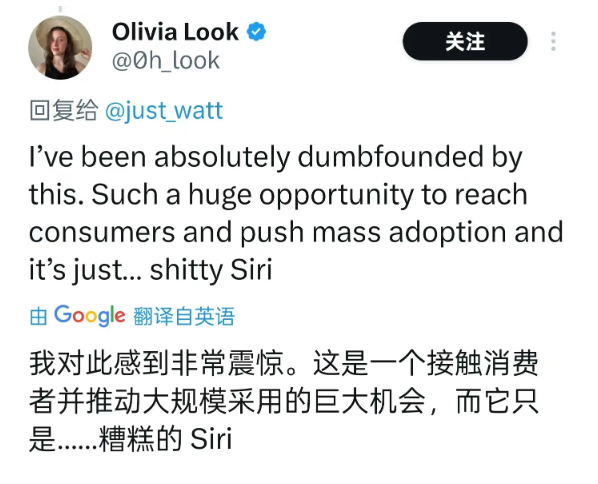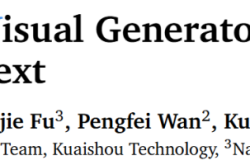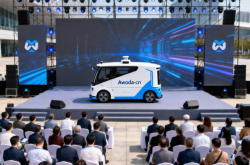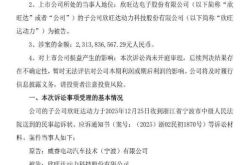Apple Seeks AI Collaboration with Tencent and ByteDance: But What iPhone Lacks is Innovation, Not Just AI
![]() 12/20 2024
12/20 2024
![]() 553
553
The AI pie isn't particularly appetizing at the moment, but Apple must serve it nonetheless.
Apple's foray into the Chinese AI market mirrors a tale of 'little tadpoles searching for their mother.'
Reuters reported that three informed sources revealed Apple is in talks with Tencent and ByteDance, aiming to integrate their large AI models into iPhones sold in the Chinese market. However, these discussions are still in their "very early stages." Additionally, Caixin exclusively learned that Apple is also in negotiations with Zhipu, bringing the number of large AI model companies in contact with Apple to at least three, in addition to Baidu.
It appears that due to issues arising from its collaboration with Baidu, Apple has once again issued a tender for the domestic version of Apple Intelligence, seeking alternative solutions.

(Image from Apple)
According to Apple's plans, the Apple Intelligence feature will initially support English in 2024, with Chinese functionality to be introduced in 2025. With less than half a month left in 2024, if there is no substantial progress in collaboration with Baidu, even a last-minute scramble by Apple cannot delay the launch of the domestic version of Apple AI.
After all, the iPhone purchase page on Apple's domestic website boldly states, 'Get ready for Apple Intelligence.'
Apple Intelligence is highly anticipated by the market, especially among domestic users, as the AI feature represents Apple's most significant perceived upgrade in recent years. However, frequent news reports have added much uncertainty to the domestic rollout of Apple AI.
Is Apple's struggle to find an alternative solution due to difficulties in collaborating with Baidu?
The journey of the domestic version of Apple Intelligence, akin to 'little tadpoles searching for their mother,' has not been as smooth as anticipated.
In iOS 18, iPadOS 18, and macOS Sequoia, Apple introduced the Apple Intelligence feature for the first time. Apple AI encompasses local small models, cloud models, and integrated third-party large models. For example, the overseas version of Apple AI integrates the capabilities of OpenAI's ChatGPT large model. However, due to issues like Chinese language support, ChatGPT cannot be used normally in China.
In the Chinese market, whether it's local models, cloud models, or third-party model services, they must comply with corresponding local regulations. To swiftly implement its AI features, Apple needs to find a suitable local large AI model service provider partner for its AI capabilities. As the flagship domestic large model, ERNIE Bot was initially considered the best partner for the domestic version of Apple AI.
The Wall Street Journal first reported in March this year that Apple was in negotiations with Baidu to use ERNIE Bot on the Chinese version of the iPhone. In June, rumors circulated that in addition to Baidu, Apple was also in contact with AI suppliers such as Alibaba and Baichuan Intelligence, but ultimately settled on Baidu's ERNIE Bot as the solution for the Chinese version of Apple AI.
On December 4, The Information reported that Apple paid up to $10 billion to use Baidu's large AI model and agreed to bear the computing costs of retraining and fine-tuning the model. However, The Information also reported that the collaboration between Apple and Baidu was not smooth.

(Image from Doubao)
Firstly, there were differences on how to use iPhone user data to train and improve models. Baidu wanted to retain user data collected through the AI search function, while Apple's AI system is designed with data privacy at its core, prohibiting the storage or sharing of personal data. Secondly, the ERNIE Bot large model struggled with understanding user prompts and responding accurately to common scenarios, seemingly underperforming expectations.
There are two paths to realizing an AI operating system: one is to rebuild a "native" AI operating system around the underlying system architecture; the other is to enhance the existing system architecture with AI features. Apple AI falls into the latter category. However, this "enhanced" AI functionality has limitations. The architecture of traditional operating systems makes it challenging to achieve large-scale parallel computing or handle complex scenarios. For instance, a simple task like automatically ordering takeout is currently difficult for Apple Intelligence due to constraints in the traditional system architecture. Additionally, different large AI models have their unique capabilities, and fully integrating them into the Apple ecosystem is not something that can be easily achieved with minor modifications. This is a challenge that Baidu and all Chinese AI services face when integrating with Apple.
Will Tencent or ByteDance's AI join 'Apple'? The first suspense of 2025!
Both Tencent and ByteDance possess impressive large AI models.
ByteDance boasts several large AI models, including Jimeng, Haimian Music, Xinghui, etc., targeting specialized fields such as images, music, and videos. However, Doubao is a general-purpose model for the masses, excelling in text and graphics. It supports image region redrawing and expansion functions, generating images with clarity surpassing other large models. Region redrawing is a capability that many large models lack. In professional scenarios, Doubao can also assist users in creating PPTs, writing code, and more.
In terms of data, ByteDance's Doubao AI surpassed 100 million downloads in September 2024 and had nearly 9 million daily active users in November, with a growth rate exceeding 15%. Its global monthly active users reached 47.02 million, ranking second on the global active user list, second only to ChatGPT.
In contrast, Tencent Yuanbao is still in its infancy and does not differ significantly from other large models. However, its intelligent agents are noteworthy. Tencent Yuanbao features multiple intelligent agents based on film and television characters, supporting chat conversations and fully restoring character settings, leveraging Tencent's strong social genes.
However, based on my experience, Tencent Yuanbao's model capabilities and Hunyuan Wensheng video large model capabilities still lag behind the mainstream. But with Tencent's abundant resources, catching up is only a matter of time.
According to Similarweb data, Tencent Yuanbao's web version had 1.08 million visitors and about 40,000 daily active users in August this year. Questmobile data shows that the Tencent Yuanbao app had nearly 600,000 monthly active users and about 70,000 daily active users in August.
Overall, ByteDance's Doubao excels in daily scenarios and boasts impressive user data, while Tencent Yuanbao stands out in "intelligent agent Cosplay." Most importantly, Tencent has the WeChat ecosystem, which is highly valued by Apple. I have observed on social media platforms that netizens tend to recommend Doubao more in daily use and have a more positive attitude towards its integration with Apple's domestic AI.
As for which large AI model Apple will ultimately collaborate with, it primarily depends on the negotiation results and whether an agreement can be reached on user privacy protection. Doubao has a larger user base, but Tencent has had a deeper, long-standing cooperative relationship with Apple.
Moreover, Apple is also in contact with multiple large AI model suppliers beyond ByteDance and Tencent, not putting all its eggs in one basket.
Even if Apple AI lands in China, it won't save the iPhone
Indeed, from an innovation perspective, Apple Intelligence is Apple's most notable upgrade in recent years. Without Apple AI, it's hard to say what new and eye-catching features the iPhone 16 series would have offered this year. However, from a consumer standpoint, curiosity about AI features outweighs their practical use.
Data released by SellCell, a US recycling company, shows that nearly half of iPhone users consider AI functionality an important factor when purchasing a device. However, 73% of users found that AI had a minimal impact on their phone experience after purchasing an iPhone. SellCell also pointed out that among Apple's various AI features, only writing tools and notification summaries had high usage rates, with over 50% of respondents having experienced them.
The usage rates of priority messages, photo cleanup, and smart replies are average, with less than 15% of respondents having experienced natural language search and transcription summaries for photos.
Many respondents also stated that once their curiosity was satisfied, the usage rate of AI features would further decline. The data clearly indicates that most users are not interested in AI features, and they have a very limited impact on enhancing the phone experience. Overseas netizen Olivia Look commented on platform X that Apple AI is a good opportunity to reach and engage consumers on a large scale, but it's just a "terrible Siri." This remark also reflects users' dissatisfaction with the Apple Intelligence feature.

(Image from X)
Even when recommending iPhones to friends, the mention of AI features lacks appeal.
I believe the reason is that there is no killer application for AI on mobile devices. Most applications are still stuck at the stage of generating information or processing photos. While they can indeed provide some value in specific scenarios, they have not fundamentally disrupted our habits of using smart devices. Moreover, many generation needs can be met by a third-party large model app.
From this perspective, whether Apple AI can find a suitable local partner and successfully introduce Apple Intelligence into the Chinese market will not significantly impact iPhone sales. Frankly, it's not as attractive as substantial subsidies. The contradiction lies in the fact that without AI features, the iPhone 16 series would be just another incremental update, offering little to discuss.
The future of AI is promising, but at this stage, it primarily showcases the characteristics of large models. AI phones and AI hardware will gain more practical significance only when native AI operating systems fundamentally change our usage habits.
To put it bluntly, the AI pie isn't tasty right now, but Apple has baked it. If Apple can't even serve this pie, Apple fans might find it hard to adapt.
Source: Leikeji








